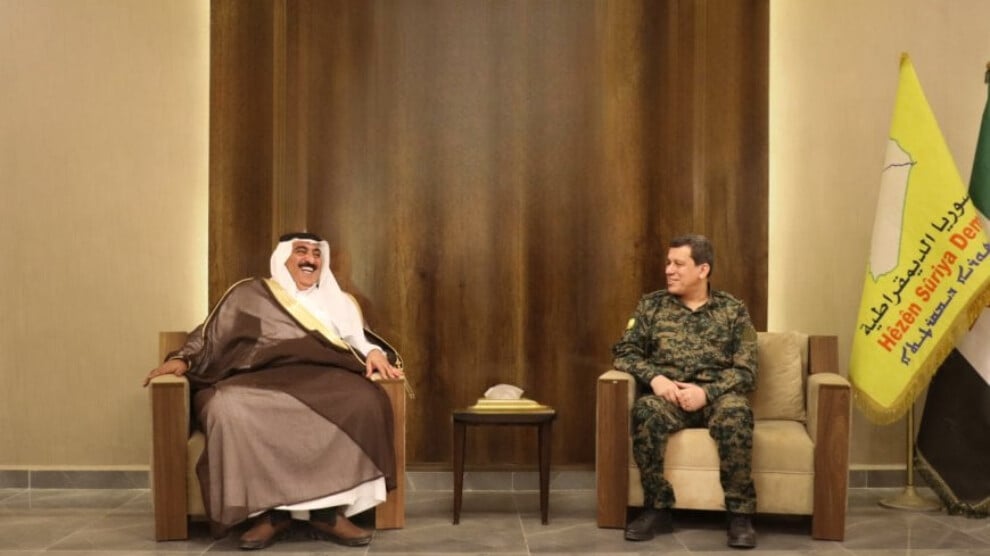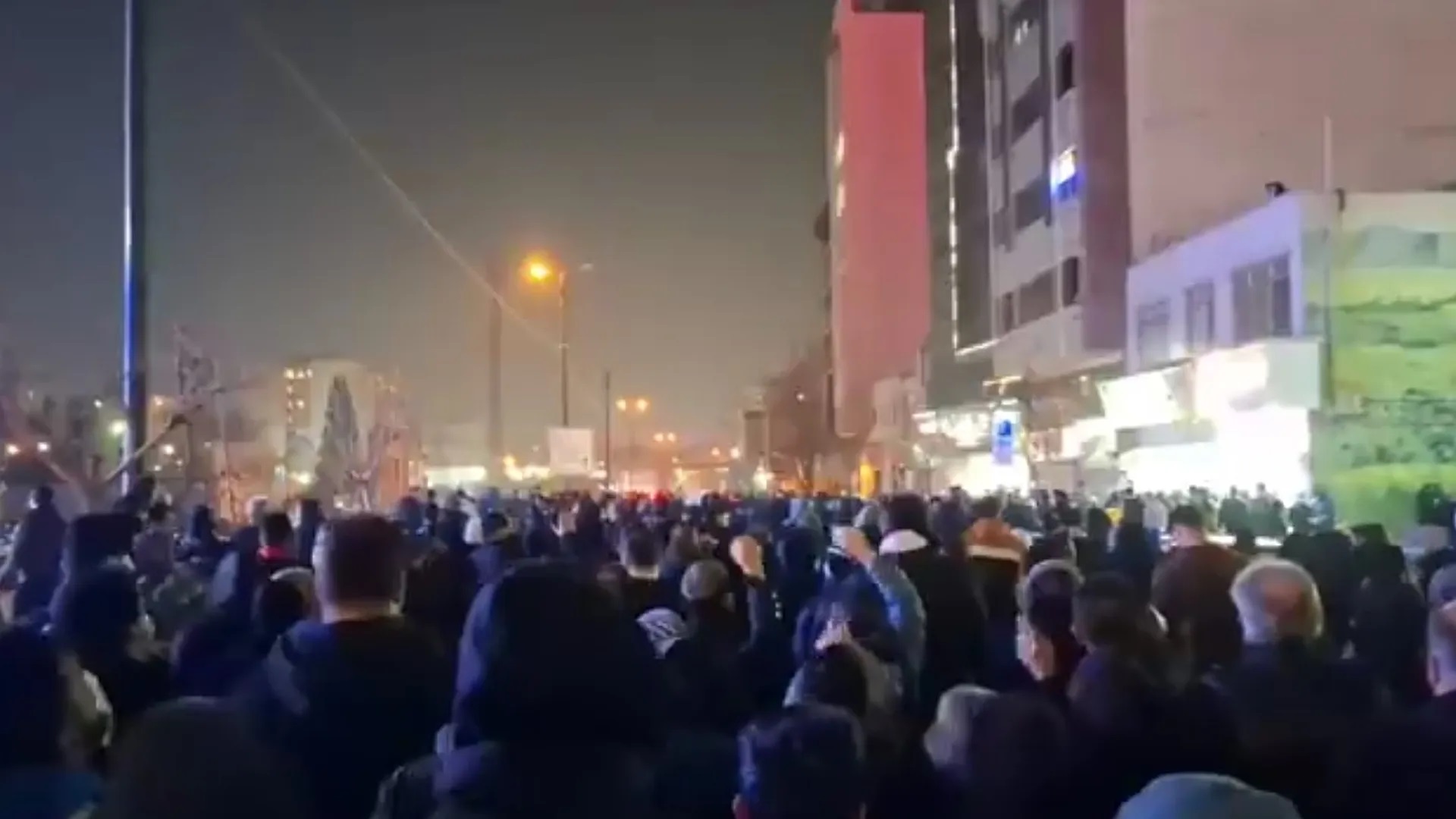Negotiations Between Kurdish-led Northeast Syria and Transitional Government Yield No Progress
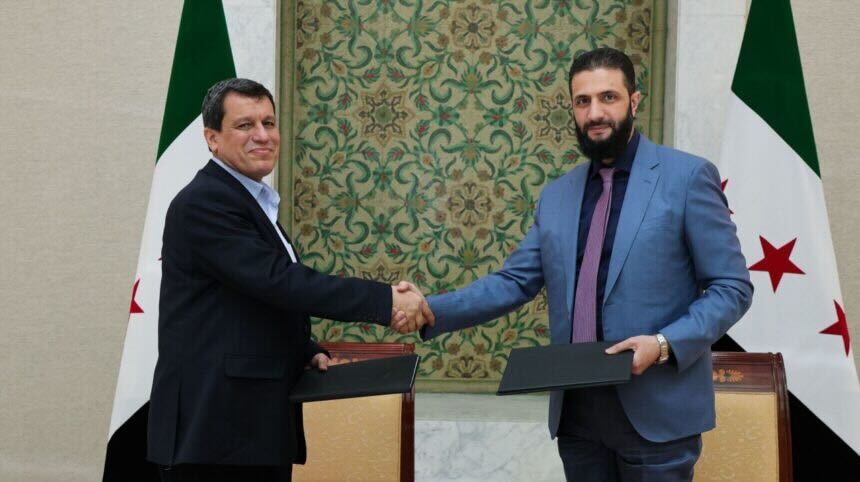
Photo credit: Syrian Arab News Agency (SANA)
Photo credit: Syrian Arab News Agency (SANA)
The negotiations between the Democratic Autonomous Administration of North and East Syria (DAANES) and the Syrian Transitional Government that began earlier this year have so far yielded no progress. Yet, both sides agreed that “external interventions should not determine the course of negotiations,” a diplomatic source familiar with the negotiations told The Amargi, speaking on condition of anonymity due to the sensitivity of the topic.
The DAANES delegation met with a Syrian Transitional Government delegation led by Syrian Interim President Ahmed al-Sharaa on 7 October 2025 in Damascus, following clashes between the Syrian Democratic Forces (SDF) and militia groups affiliated with the Syrian Transitional Government in Aleppo. The DAANES delegation consisted of SDF General Commander Mazlum Abdi, DAANES foreign affairs co-representative Ilham Ehmed, and Women’s Protection Units (YPJ) commander Rohilat Efrîn. The transitional government was represented by interim president Ahmed al-Shara and foreign minister Assaad al-Shaibani.
“The new leadership in Damascus seems to kill time with diplomatic exchanges of smiles, while waiting to see where regional developments will lead…”
Although the meeting helped ease tensions, both sides’ “distrust of each other” remains a key obstacle to further developing the negotiations, the source told The Amargi. “The new leadership in Damascus seems to kill time with diplomatic exchanges of smiles, while waiting to see where regional developments will lead and whether the U.S. will remain committed to supporting the SDF,” the source further clarified.
The diplomatic source further added that, although both sides discussed the 19-point agreement signed between al-Sharaa and Abdi in March, nothing developed beyond discussion. However, both sides agreed to prevent external intervention.”
According to the source, the Syrian Transitional Government’s delegation shared its concerns about Kurdish-held tunnels in Aleppo, but the DAANES delegation insisted that such claims are “baseless.”
Another source, familiar with talks between the U.S. and the transitional government, told The Amargi that the latter had requested to join the Global Coalition to Defeat ISIS; however, the U.S. declined. Washington remains suspicious of the new Syrian leadership due to its extremist roots.
A day before the Syrian-Syrian meeting in Damascus, the SDF met with a U.S. delegation led by U.S. Special Envoy to Syria, Tom Barrack, and Commander of the U.S. Central Command, Brad Cooper, in Qamishli. The U.S. has repeatedly stated its commitment to support the SDF in curbing ISIS resurgence in Syria. However, for Syria to be stabilized, the DAANES and Turkey must reach some agreement.
Without a Turkey-AANES rapprochement, the Syrian Transitional Government appears unable to make decisions.
Without a Turkey-AANES rapprochement, the Syrian Transitional Government appears unable to make decisions. Turkey has historically supported Islamist militias in Syria to topple the al-Assad rule and prevent any form of Kurdish self-determination.
The Syrian Transitional Government’s policies toward the Kurds have been influenced by Turkey since the ousting of Bashar al-Assad at the end of 2024. Turkey considers the DAANES an extension of the Kurdistan Workers’ Party (PKK), a guerrilla group fighting an armed struggle against the Turkish state for the Kurdish people’s liberation since 1984. After the collapse of peace talks between the PKK and Turkey in 2015, Turkey attacked the DAANES, invading and occupying Kurdish-majority territories in northern Syria.
Since October 2024, talks to initiate peace negotiations between Turkey and the PKK have resumed, with the situation of Syria presenting a major point of tension between the parties. While the Kurds seek to be integrated into a democratic and secular Syrian state with local self-rule, Turkey opposes any form of Kurdish autonomy.
On his side, Yasser Suleiman, spokesperson for the DAANES’s delegation, told The Amargi that March meetings “built trust” and yielded two concrete steps: relocating state exam centers for basic and secondary students from west of the Euphrates to the DAANES, with the administration covering all logistics, and a reciprocal detainee exchange in Aleppo’s Sheikh Maqsoud and Ashrafiyeh districts.
Since then, momentum has slowed. Suleiman blamed pressures on Damascus and what he called a misreading of the March 10 agreement signed by Ahmed al-Sharaa and Mazloum Abdi. The deal, he said, is designed to deliver “institutional integration”; administrative, military, civil, and security, through joint technical committees. From the DAANES side, economic, education, border-crossing, military, and even constitutional committees are “fully ready,” he said, while awaiting counterparts from the government.
“The agreement is clear: institutional integration; administrative, military, civil, and security, not a handover”
“The agreement is clear: institutional integration; administrative, military, civil, and security, not a handover,” Suleiman insisted. Adding: “We seek to merge institutions while safeguarding the rights of employees and residents under inclusive mechanisms, all within a unified Syria.”
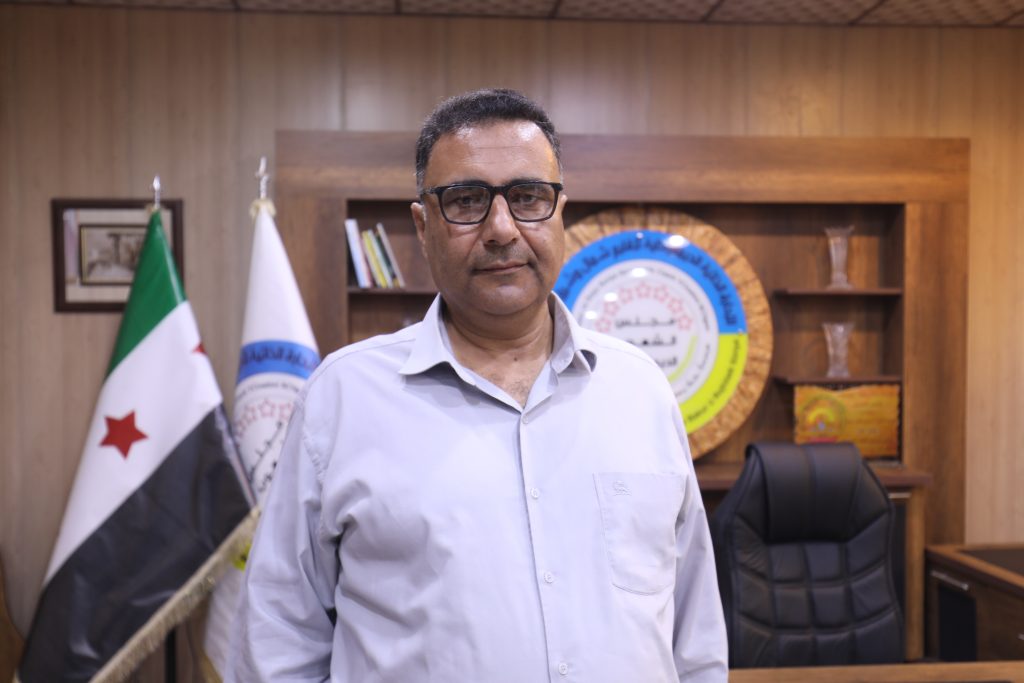
Despite tensions, Sueilman said, the 7 October negotiations produced tentative understandings: a comprehensive cease-fire in the north and northeast, including Aleppo’s Kurdish neighborhoods; a verbal framework to integrate DAANES military and security structures into a unified national chain of command; and discussion of a joint force to combat ISIS.
Pushing back on media claims, he insisted the delegation has not demanded autonomy or federalism. Instead, he outlined expanded local administration, governors and mayors elected by their provinces, as compatible with national unity. He called for potential international guarantors (the United States, Jordan, Saudi Arabia, Qatar, France, and the United Kingdom) to help lock in any deal, while stressing there is “no intention or mandate” for secession.
More meetings are expected “soon,” with venue flexible—Damascus or the northeast. “Our aim,” Suleiman said, “is a unified Syria and the protection of all its historic communities—through institutions that serve, not divide.”
Despite the recently announced ceasefire, Syrian government forces launched new attacks on 9 October in the countryside of Manbij and Deir ez-Zor.
Amid these developments, clashes on the ground continue. Despite the recently announced ceasefire, Syrian government forces launched new attacks on 9 October in the countryside of Manbij and Deir ez-Zor. Clashes erupted near the Tishrin Dam after Damascus forces attempted to infiltrate positions held by the SDF. One member of the government forces was killed before the retreat. Later in the day, government troops shelled the Seritel Hill area and used drones to strike an SDF post in Deir ez-Zor, killing one SDF fighter and wounding nine others. The SDF responded with cross-river fire.
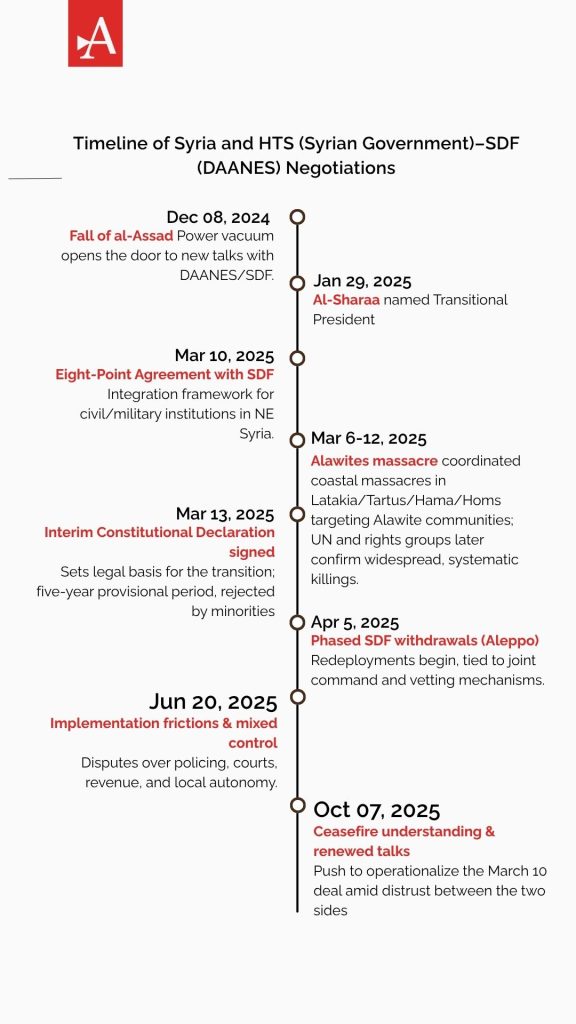
The Amargi’s correspondent Abbas Abbas in the northeast Syria contributed to this report.
The Amargi
Amargi Columnist

